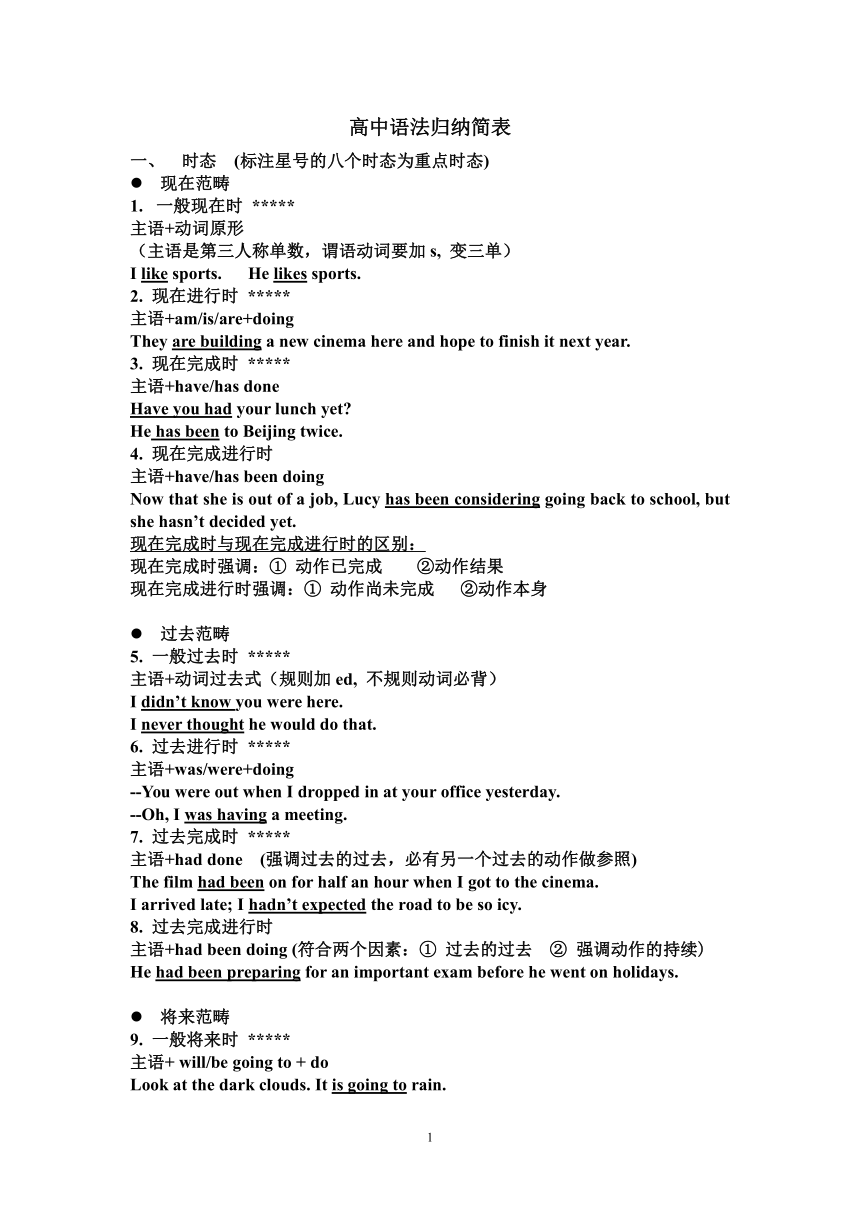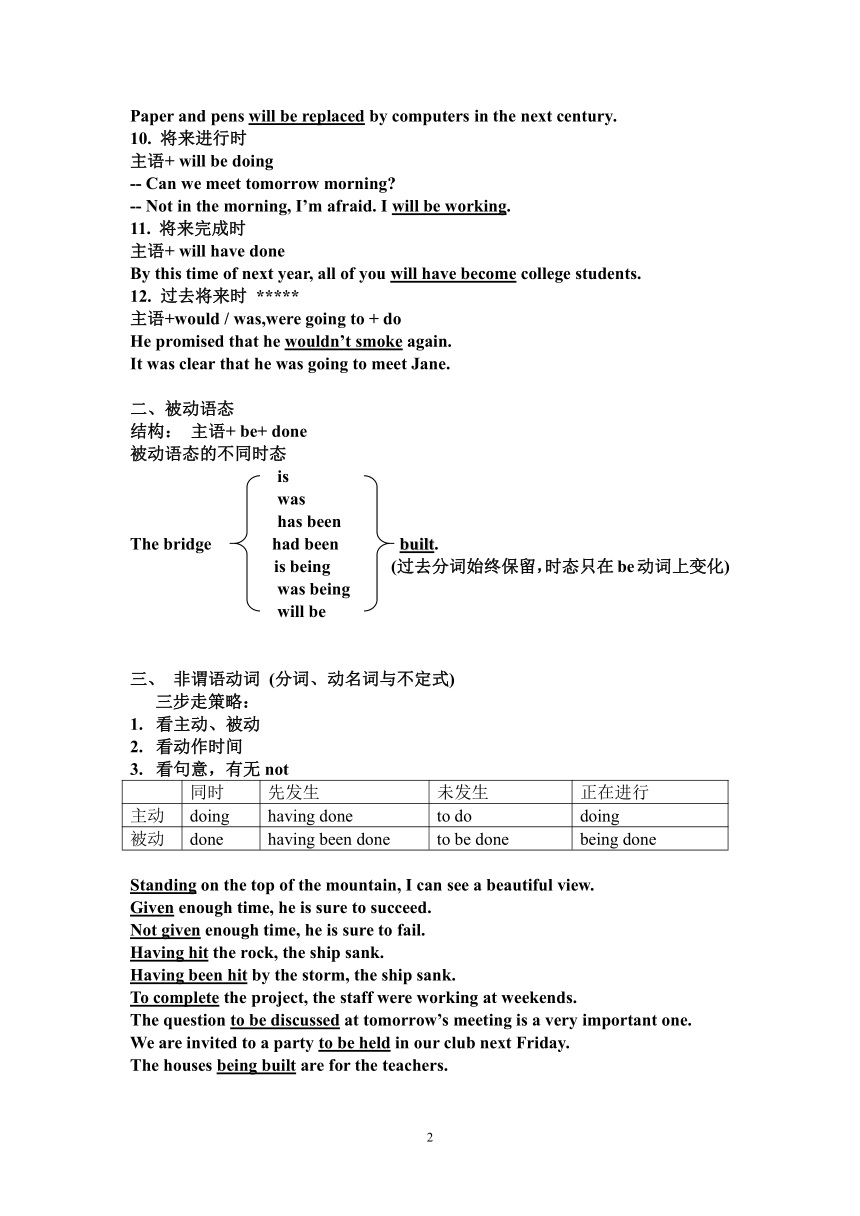2023届高考英语语法转型:高中语法重点归纳
文档属性
| 名称 | 2023届高考英语语法转型:高中语法重点归纳 |

|
|
| 格式 | zip | ||
| 文件大小 | 63.5KB | ||
| 资源类型 | 教案 | ||
| 版本资源 | 通用版 | ||
| 科目 | 英语 | ||
| 更新时间 | 2022-12-07 00:00:00 | ||
图片预览


文档简介
高中语法归纳简表
1、 时态 (标注星号的八个时态为重点时态)
现在范畴
1. 一般现在时 *****
主语+动词原形
(主语是第三人称单数,谓语动词要加s, 变三单)
I like sports. He likes sports.
2. 现在进行时 *****
主语+am/is/are+doing
They are building a new cinema here and hope to finish it next year.
3. 现在完成时 *****
主语+have/has done
Have you had your lunch yet
He has been to Beijing twice.
4. 现在完成进行时
主语+have/has been doing
Now that she is out of a job, Lucy has been considering going back to school, but she hasn’t decided yet.
现在完成时与现在完成进行时的区别:
现在完成时强调:① 动作已完成 ②动作结果
现在完成进行时强调:① 动作尚未完成 ②动作本身
过去范畴
5. 一般过去时 *****
主语+动词过去式(规则加ed, 不规则动词必背)
I didn’t know you were here.
I never thought he would do that.
6. 过去进行时 *****
主语+was/were+doing
--You were out when I dropped in at your office yesterday.
--Oh, I was having a meeting.
7. 过去完成时 *****
主语+had done (强调过去的过去,必有另一个过去的动作做参照)
The film had been on for half an hour when I got to the cinema.
I arrived late; I hadn’t expected the road to be so icy.
8. 过去完成进行时
主语+had been doing (符合两个因素:① 过去的过去 ② 强调动作的持续)
He had been preparing for an important exam before he went on holidays.
将来范畴
9. 一般将来时 *****
主语+ will/be going to + do
Look at the dark clouds. It is going to rain.
Paper and pens will be replaced by computers in the next century.
10. 将来进行时
主语+ will be doing
-- Can we meet tomorrow morning
-- Not in the morning, I’m afraid. I will be working.
11. 将来完成时
主语+ will have done
By this time of next year, all of you will have become college students.
12. 过去将来时 *****
主语+would / was,were going to + do
He promised that he wouldn’t smoke again.
It was clear that he was going to meet Jane.
二、被动语态
结构: 主语+ be+ done
被动语态的不同时态
is
was
has been
The bridge had been built.
is being (过去分词始终保留,时态只在be动词上变化)
was being
will be
三、 非谓语动词 (分词、动名词与不定式)
三步走策略:
1. 看主动、被动
2. 看动作时间
3. 看句意,有无not
同时 先发生 未发生 正在进行
主动 doing having done to do doing
被动 done having been done to be done being done
Standing on the top of the mountain, I can see a beautiful view.
Given enough time, he is sure to succeed.
Not given enough time, he is sure to fail.
Having hit the rock, the ship sank.
Having been hit by the storm, the ship sank.
To complete the project, the staff were working at weekends.
The question to be discussed at tomorrow’s meeting is a very important one.
We are invited to a party to be held in our club next Friday.
The houses being built are for the teachers.
doing与to do做动词宾语的归类
⑴ 只能加(not)to do做宾语的动词
口诀:决心学会想希望,拒绝设法愿假装
主动答应选计划,同意请求帮一帮
decide/determine, learn, want, expect/hope/wish;
refuse, manage, care, pretend;
offer, promise, choose, plan;
agree, ask/beg, help
此外,afford, strive, happen, wait也要用to do做宾语
e.g. She pretended not to see me when I passed by.
We agreed to meet here but so far she hasn’t turned up yet.
⑵ 只能加doing做宾语的动词
口诀:考虑建议盼原谅,承认推迟没得想
避免错过继续练,否认完成就欣赏
禁止想象才冒险,不禁介意准逃亡
consider, suggest/advise, look forward to, excuse/pardon;
admit, delay/put off, fancy;
avoid, miss, keep/keep on, practice;
deny, finish, enjoy/appreciate;
forbid, imagine, risk;
can’t help, mind, allow/permit, escape
(注意allow/permit sb. to do sth.)
e.g. He got well-prepared for the job interview, for he couldn’t risk losing the good opportunity.
⑶ 既可加doing, 又可加to do, 但意义上有区别
todo sth 忘记做某事(未做)
forget
doing sth 忘记已经做过某事(已做过)
to do sth 记住要做某事
remember
doing sth 记得曾经做过某事
to do sth. 遗憾要去做某事
regret
doing sth 后悔做过某事
to do sth 停下来去做另一件事
stop
doing sth 停止做某事
to do sth 努力做某事
try
doing sth 尝试着做某事
to do sth 打算做某事
mean
doing sth 意味着做某事
to do sth (做完某事)接着做另一件事
go on
doing sth 继续做同一件事
( go on with sth )
四、定语从句
1. 找先行词
2. 判断先行词在定语从句中的成分
主语 宾语(可省) 地状 时状 所属 整个句子
人 who/that who(m)/that —— —— whose ——
物 which/that which/that where或介词+which when或介词+which whose或the+名+of which which
五、状语从句连词
so/such…that… 如此…以至于…
so that…/ in order that…为了,目的是…
in case/ for fear that… 以防
unless… 除非
if / on condition that / suppose / supposing / provided that….如果
as/so long as… 只要
as if / as though… 好像
although/though/even if/even though/while… 尽管, 虽然
since 自从 / 既然,由于
while ①当…时候; ②表对比:然而,但是; ③尽管,虽然
not…until…直到…才…
as soon as…/ the moment / hardly…when…/ no sooner…than… 一…就…
六、虚拟语气
⑴ 条件句
1. 零条件句:条件必然导致结果 主现从现
真实条件句 Ice melts if the sun shines on it.
2. 第一条件句:条件可能导致结果 主将从现
We will go for a picnic if it is a fine day tomorrow.
3. 第二条件句:对现在的假设
If 主语+did/were, 主句+would do
虚拟条件句 If I were you, I wouldn’t do that. 混合虚拟句
4. 第三条件句:对过去的假设
If 主语+had done, 主句+would have done
If he had attended the meeting, he would have seen her.
⑵ 在一些表示建议、愿望、命令的动词引导的宾语从句中(如:suggest, insist, demand, order, require, insist, propose, advise),从句中的谓语动词要用should + do, should可以省略。
He suggested that we (should) start off early the next day.
The doctor ordered that the patient (should) be sent to hospital without delay.
⑶ wish/if only…表遗憾,译为“要是…就好了”
did / were (对现在的遗憾)
wish/if only + 主语 had done (对过去的遗憾)
could/would/might do (对将来的遗憾)
How I wish I had listened to my parents’ advice.
If only I were you!
七、情态动词表示推测
1. “一定,肯定” 非常肯定的推测 must
2. “可能” 不太肯定的推测 may, might, could (can用于疑问句)
3. “可能不” 不太肯定的推测 may not / might not
4. “不可能” 肯定的推测 can’t
与之匹配的时态
1. 一般:情动+do
2. 进行:情动+be+doing
3. 过去:情动+have done
八、形容词的排序口诀
美小圆旧黄,法国木书房
PAGE
5
1、 时态 (标注星号的八个时态为重点时态)
现在范畴
1. 一般现在时 *****
主语+动词原形
(主语是第三人称单数,谓语动词要加s, 变三单)
I like sports. He likes sports.
2. 现在进行时 *****
主语+am/is/are+doing
They are building a new cinema here and hope to finish it next year.
3. 现在完成时 *****
主语+have/has done
Have you had your lunch yet
He has been to Beijing twice.
4. 现在完成进行时
主语+have/has been doing
Now that she is out of a job, Lucy has been considering going back to school, but she hasn’t decided yet.
现在完成时与现在完成进行时的区别:
现在完成时强调:① 动作已完成 ②动作结果
现在完成进行时强调:① 动作尚未完成 ②动作本身
过去范畴
5. 一般过去时 *****
主语+动词过去式(规则加ed, 不规则动词必背)
I didn’t know you were here.
I never thought he would do that.
6. 过去进行时 *****
主语+was/were+doing
--You were out when I dropped in at your office yesterday.
--Oh, I was having a meeting.
7. 过去完成时 *****
主语+had done (强调过去的过去,必有另一个过去的动作做参照)
The film had been on for half an hour when I got to the cinema.
I arrived late; I hadn’t expected the road to be so icy.
8. 过去完成进行时
主语+had been doing (符合两个因素:① 过去的过去 ② 强调动作的持续)
He had been preparing for an important exam before he went on holidays.
将来范畴
9. 一般将来时 *****
主语+ will/be going to + do
Look at the dark clouds. It is going to rain.
Paper and pens will be replaced by computers in the next century.
10. 将来进行时
主语+ will be doing
-- Can we meet tomorrow morning
-- Not in the morning, I’m afraid. I will be working.
11. 将来完成时
主语+ will have done
By this time of next year, all of you will have become college students.
12. 过去将来时 *****
主语+would / was,were going to + do
He promised that he wouldn’t smoke again.
It was clear that he was going to meet Jane.
二、被动语态
结构: 主语+ be+ done
被动语态的不同时态
is
was
has been
The bridge had been built.
is being (过去分词始终保留,时态只在be动词上变化)
was being
will be
三、 非谓语动词 (分词、动名词与不定式)
三步走策略:
1. 看主动、被动
2. 看动作时间
3. 看句意,有无not
同时 先发生 未发生 正在进行
主动 doing having done to do doing
被动 done having been done to be done being done
Standing on the top of the mountain, I can see a beautiful view.
Given enough time, he is sure to succeed.
Not given enough time, he is sure to fail.
Having hit the rock, the ship sank.
Having been hit by the storm, the ship sank.
To complete the project, the staff were working at weekends.
The question to be discussed at tomorrow’s meeting is a very important one.
We are invited to a party to be held in our club next Friday.
The houses being built are for the teachers.
doing与to do做动词宾语的归类
⑴ 只能加(not)to do做宾语的动词
口诀:决心学会想希望,拒绝设法愿假装
主动答应选计划,同意请求帮一帮
decide/determine, learn, want, expect/hope/wish;
refuse, manage, care, pretend;
offer, promise, choose, plan;
agree, ask/beg, help
此外,afford, strive, happen, wait也要用to do做宾语
e.g. She pretended not to see me when I passed by.
We agreed to meet here but so far she hasn’t turned up yet.
⑵ 只能加doing做宾语的动词
口诀:考虑建议盼原谅,承认推迟没得想
避免错过继续练,否认完成就欣赏
禁止想象才冒险,不禁介意准逃亡
consider, suggest/advise, look forward to, excuse/pardon;
admit, delay/put off, fancy;
avoid, miss, keep/keep on, practice;
deny, finish, enjoy/appreciate;
forbid, imagine, risk;
can’t help, mind, allow/permit, escape
(注意allow/permit sb. to do sth.)
e.g. He got well-prepared for the job interview, for he couldn’t risk losing the good opportunity.
⑶ 既可加doing, 又可加to do, 但意义上有区别
todo sth 忘记做某事(未做)
forget
doing sth 忘记已经做过某事(已做过)
to do sth 记住要做某事
remember
doing sth 记得曾经做过某事
to do sth. 遗憾要去做某事
regret
doing sth 后悔做过某事
to do sth 停下来去做另一件事
stop
doing sth 停止做某事
to do sth 努力做某事
try
doing sth 尝试着做某事
to do sth 打算做某事
mean
doing sth 意味着做某事
to do sth (做完某事)接着做另一件事
go on
doing sth 继续做同一件事
( go on with sth )
四、定语从句
1. 找先行词
2. 判断先行词在定语从句中的成分
主语 宾语(可省) 地状 时状 所属 整个句子
人 who/that who(m)/that —— —— whose ——
物 which/that which/that where或介词+which when或介词+which whose或the+名+of which which
五、状语从句连词
so/such…that… 如此…以至于…
so that…/ in order that…为了,目的是…
in case/ for fear that… 以防
unless… 除非
if / on condition that / suppose / supposing / provided that….如果
as/so long as… 只要
as if / as though… 好像
although/though/even if/even though/while… 尽管, 虽然
since 自从 / 既然,由于
while ①当…时候; ②表对比:然而,但是; ③尽管,虽然
not…until…直到…才…
as soon as…/ the moment / hardly…when…/ no sooner…than… 一…就…
六、虚拟语气
⑴ 条件句
1. 零条件句:条件必然导致结果 主现从现
真实条件句 Ice melts if the sun shines on it.
2. 第一条件句:条件可能导致结果 主将从现
We will go for a picnic if it is a fine day tomorrow.
3. 第二条件句:对现在的假设
If 主语+did/were, 主句+would do
虚拟条件句 If I were you, I wouldn’t do that. 混合虚拟句
4. 第三条件句:对过去的假设
If 主语+had done, 主句+would have done
If he had attended the meeting, he would have seen her.
⑵ 在一些表示建议、愿望、命令的动词引导的宾语从句中(如:suggest, insist, demand, order, require, insist, propose, advise),从句中的谓语动词要用should + do, should可以省略。
He suggested that we (should) start off early the next day.
The doctor ordered that the patient (should) be sent to hospital without delay.
⑶ wish/if only…表遗憾,译为“要是…就好了”
did / were (对现在的遗憾)
wish/if only + 主语 had done (对过去的遗憾)
could/would/might do (对将来的遗憾)
How I wish I had listened to my parents’ advice.
If only I were you!
七、情态动词表示推测
1. “一定,肯定” 非常肯定的推测 must
2. “可能” 不太肯定的推测 may, might, could (can用于疑问句)
3. “可能不” 不太肯定的推测 may not / might not
4. “不可能” 肯定的推测 can’t
与之匹配的时态
1. 一般:情动+do
2. 进行:情动+be+doing
3. 过去:情动+have done
八、形容词的排序口诀
美小圆旧黄,法国木书房
PAGE
5
